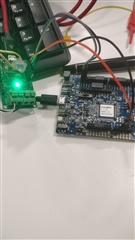Hi
I am working with a Nordic nrf52840dk using segge and sdk 16.
I am using the nordic UART example in examples/peripheral/uart.
The issue I am having is that my data being sent to this device can not be read from the nordic board.
Below is an example of the code going into my Putty terminal from my UART peripheral device.
1,1183,1,1169 1,1183,1,1169 1,1183,1,1169 1,1183,1,1169 1,1183,1,1169 1,1183,1,1169
This device has 4 wire connections RX,TX,CTS and RTS. My connections are listed below:
Note this is the default.
#define RX_PIN_NUMBER 8
#define TX_PIN_NUMBER 6
#define CTS_PIN_NUMBER 7
#define RTS_PIN_NUMBER 5
The first thing i tried was running the code with no change to see if app_uart_get(&cr) would pull this data. Unfortunately it did not. It does however, pull data that i type into the terminal.
What I want to do is to take this data from the UART(Sensor data) and store it as a variable for handling later on.
I which to know how I can pull this data from the serial connection.
Side note when the device (UART) is plugged in printing from putty does not run. If I unplug the device then printing works fine. Below is my main code (from example).
int main(void)
{
uint32_t err_code;
bsp_board_init(BSP_INIT_LEDS);
const app_uart_comm_params_t comm_params =
{
RX_PIN_NUMBER,
TX_PIN_NUMBER,
RTS_PIN_NUMBER,
CTS_PIN_NUMBER,
UART_HWFC,
false,
#if defined (UARTE_PRESENT)
NRF_UARTE_BAUDRATE_115200
#else
NRF_UARTE_BAUDRATE_115200
#endif
/*
#if defined (UART_PRESENT)
NRF_UART_BAUDRATE_115200
#else
NRF_UARTE_BAUDRATE_115200
#endif
*/
};
APP_UART_FIFO_INIT(&comm_params,
UART_RX_BUF_SIZE,
UART_TX_BUF_SIZE,
uart_error_handle,
APP_IRQ_PRIORITY_HIGH,
//APP_IRQ_PRIORITY_LOWEST,
err_code);
APP_ERROR_CHECK(err_code);
#ifndef ENABLE_LOOPBACK_TEST
printf("\r\nUART example started.\r\n");
while (true)
{
uint8_t cr;
while (app_uart_get(&cr) != NRF_SUCCESS);
while (app_uart_put(cr) != NRF_SUCCESS);
if (cr == 'q' || cr == 'Q')
{
printf(" \r\nExit!\r\n");
while (true)
{
// Do nothing.
}
}
}
#else
// This part of the example is just for testing the loopback .
while (true)
{
uart_loopback_test();
}
#endif
}



